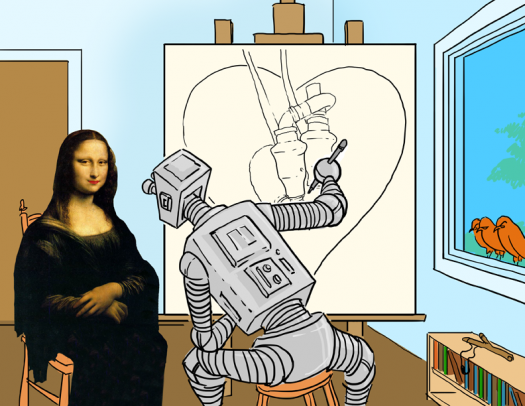| 小托福大智慧--阅读系列【科技之光】——林洁 | |||
|
|||
|
Many people think of the 1950s as the golden age of science fiction. It was a time when anything seemed possible. Science fiction writers, filmmakers, artists, and inventors made wild and exciting predictions about our world today. They predicted a world full of futuristic cities, flying cars, space travel, computers, and robots. How accurate were they? Dose our life today look anything like their predictions? Robots in the Home In his 1950s book The Martian Chronicles, Ray Bradbury describes a house that talks. From inside the walls, a voice tells people when to wake up, what clothes are appropriate for the weather, and if it is someone’s birthday. Bradbury created a robot for every chore. One robot cooks while other robots set the table and wash the dishes. But Bradbury wasn’t the only person to imagine a house of the future. In 1955, Disneyland opened a theme park called Tomorrowland that had a “smart” house made entirely of plastic. Lights turned on and off automatically. Water filled the bathtub to the perfect temperature. Although we don’t yet have robots that set the dinner table, electric appliances are a big part of our lives today. Microwave ovens and rice cookers prepare our meals in minutes. A thermometer controls our air conditioning. Robot vacuum cleaners clean our floors without human help. Life in Space Some writers, scientists, and artists imagined whole cities in space and thought that by the early 1990s, humans would live on the moon. They predicted that we would live on space stations, grow food without soil, and get power from the sun. These ideas weren’t crazy. We may not live on Mars yet, but astronauts orbit our planet for months. We grow fruits and vegetables on Earth without soil. Many homes use solar energy, and some cars and planes run on power from the sun, too. Fast Forward It’s hard to imagine a world without computers, but in 1950, only a few computers existed. Few people imagined that computers would have common, everyday uses. In the 1950s, computers were slow, unreliable, and huge — each one the size of a room. The science magazine Popular Mechanics predicted that computers in the future could weigh about 1,500 kg, which was considered light at that time! Today, some laptops weigh less than 2kg. Then, a computer chip was invented that eventually made computers smaller, cheaper, and more useful to people. There are more than a billion computers in the world today. The future of the 1950s has arrived! Think about your future and start dreaming. If we developed the technology, would you fly to work with a jetpack? Would you download digital books straight into your brain? Would you wear a suit to become invisible or live in an underwater city? What else? Think big. Think fantastic! The future is yours to invent. Answer the questions about Back to the Future. 1. The predictions of the 1950s were accurate. a. never b. sometimes c. usually d. seldom 2. Ray Bradbury’s science fiction stories prove that imagination . a. always leads to inventions b. is fun but not useful c. can sometimes become reality d. can be too fantastic 3. Bradbury’s and Tomorrowland’s smart houses were similar because they both . a. talked to their owners b. used robots to do chores c. did things automatically d. have clever people living there 4. Which one is NOT TRUE? a. People can grow fruits and vegetables without soil. b. Many homes use solar energy. c. Some cars and planes run on power from the sun d. People may live on the Mars. 5. Why does the author write about life on other planets? a. to show that predictions from the 1950s were usually wrong b. to show that not all the 1950s predictions were wrong c. to predict what life will be like in the future d. to show the life on earth is the best 6. The word”unreliable” in the last paragraph can be replaced by_____. a. unstable b. unimaginable c.unrealistic d. unfavorable 7. The most accurate predictions from the 1950s were about . a. electric appliances b.computers c. space travel d. digital books
Key: 1)b 根据副标题‘Roberts in the Home’以下第三段至第四段得知,50年代的预测有时能成为现实。 2)c 3)c 细节题,根据句意,a项在Tomorrowland里未涉及。 4)d 5)c 由副标题‘Life in Space’第二段得知,a,b项不涉及1950s的事情。 6)a unreliable不可靠的,指代不稳定 7)b 由最后一段得知。
A history of bad predictions: There will never be a bigger plane built. Boeing engineer, 1933(talk about a plane that holds 10 people)
It will be gone by June. Variety magazine, 1955(talking about rock and roll music)
A rocket will never be able to leave the Earth’s atmosphere. New York Times newspaper, 1936
Radio has no future. William Thomson, British scientist, 1899
Children just aren’t interested in witches and wizards anymore. A book publisher to J.K.Rowling (author of the Harry Potter series), 1996
Nuclear powered vacuum cleaners will probably be a reality in 10 years. Alex Lewyt (president of a vacuum cleaner company), 1955
Idiom: People who have their “head in the clouds” ______. A. Are very tall B. Daydream all the time C. Make bad predictions Key: B
|
|||
|
| 评论·留言 |
| 新闻·热点 | 更多 |
| 开放课堂 | 更多 |
| 热荐课程 | 更多 |

国际音标班-YY-MC-165709 开班时间:2016-07-04 上课时间:13:00-16:00 价格:2980 
在线预约立减50元 
小托福能力提高班-YY-ZS-165288 开班时间:2016-07-04 上课时间:09:00-12:10 价格:7080 
在线预约立减50元 
TOEFL考前强化小班-YY-RG-163998 开班时间:2016-10-29 上课时间:12:30-15:00 价格:18800 
在线预约立减50元 
TOEFL考前强化小班-YY-RG-164002 开班时间:2016-10-08 上课时间:15:30-18:00 价格:18800 
在线预约立减50元 
出国留学基础小班-YY-RG-163980 开班时间:2016-10-15 上课时间:18:30-21:00 价格:12800 
在线预约立减50元 
TOEFL考前强化小班-YY-RG-164003 开班时间:2016-10-08 上课时间:15:30-18:00 价格:18800 
在线预约立减50元








































